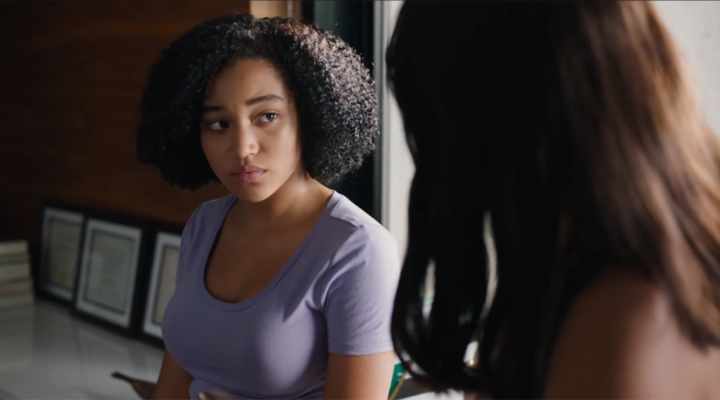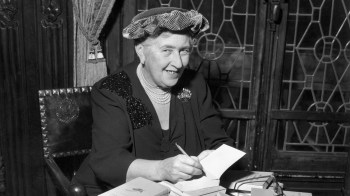
How do books get adapted into movies?
Share Now on:
How do books get adapted into movies?

It’s been a pretty good year for young adult novels in Hollywood — look no further than the recent hit “To All the Boys I’ve Loved Before,” which is getting a sequel on Netflix. The summer breakout film, starring Lana Condor and Noah Centineo, is based on the first of a trilogy of novels from author Jenny Han, who launched the series in 2014.
Young adult books can come with a loyal built-in audience, which is exactly why producers gravitate toward them. In 2018, adaptations have included “The Hate U Give,” “Ready Player One,” and “Love, Simon.”
But the process to adapt a book into a movie can be incredibly complicated — if you can even get the rights to develop an author’s work.
Judy Blume, for example, turned down numerous offers from film producers to adapt her coming-of-age novel “Are you There, God? It’s Me, Margaret,” until October — about half a century after it was first published. She finally sold the rights to her classic, which taught millions of readers about the struggles of growing up, to producer James L. Brooks from Gracie Films and screenwriter-director Kelly Fremon Craig, the team behind the teen film “Edge of Seventeen,” which starred Hailee Steinfeld.
Why authors might get protective over their material
There are some writers — like “Catcher in the Rye” author J.D. Salinger — who refused their entire lives to allow their work to be adapted, said Jason Squire, a professor at the USC School of Cinematic Arts and author of “The Movie Business Book.”
For authors, it’s crucial that filmmakers understand and respect their material.
“Writing a book is sort of a lonely and personal process. To give it to someone else, you have to trust that they match your vision … [and] bring the same sort of passion and commitment that you did,” said Nicola Yoon, author of the #1 New York Times Bestseller “Everything, Everything.” The young adult novel, which was adapted into a 2017 film starring Amandla Stenberg, is about a young girl with an immune disorder who rebels against her mother’s strict rules after falling for a boy who moves in next door.
Yoon’s second novel, “The Sun is Also a Star,” has also been adapted into a movie, which is set to be released next year. The book focuses on a 17-year-old Jamaican immigrant named Natasha Kingsley, who’s about to be deported, and the relationship she forms with a Korean-American man named Daniel Bae.
“It takes a long time to write a book. And if you’re proud of that, you really want someone to do right by it,” she said.
One of the first people that Yoon met during the making of “Everything, Everything” was the director, Stella Meghie, whom she clicked with right away.
“She is this Jamaican woman by way of Canada,” Yoon said, “And I am actually from Jamaica. So when we first met, we had, like I always say, this Vulcan-mindmeld. Like, a Jamaican-Vulcan mindmeld.”
Current trends
While some young adult novels are getting the big-screen treatment, television and streaming services like Netflix have also been eager to make their own adaptations.
“Books are very desirable for the television marketplace now,” said Holly Frederick, a dramatic rights agent at the literary agency Curtis Brown, Ltd. “There are so many buyers out there. There’s a new streaming platform that comes out everyday, a new cable channel that comes out everyday.”
Frederick said that in her experience, it’s harder to sell young adult works in the feature film space, compared to when “Twilight” and the “Hunger Games” were popular.
“Studios tend to be looking for an audience that is broader than just kids,” she said, which can make TV and streaming adaptations more appealing.
Josie Freedman, a longtime media rights agent at the talent and literary agency ICM Partners, said that for her, she’s noticing movie and TV buyers are interested in young adult books in the romantic comedy and fantasy genres.
“I think the fantasy provides a sense of escapism, and I think the young adult romantic comedy on the opposite spectrum is oddly relatable,” Freedman said. “And they’re both ultimately fun and entertaining.”
The nuts and bolts of production
So what happens when a producer finds a book they think will translate well to television or a big screen movie, and the author agrees?
First the producer might approach a literary agent and negotiate an “option/purchase agreement,” according to Holly Frederick.
USC’s Jason Squire said that involves two financial transactions. Taking an “option” on a book basically gives someone the right to *buy* the rights — they don’t have the actual rights just yet.
Option periods could last between 6 to 18 months, and Squire said it’s tough to pin down how much they might typically cost, since it’s all negotiable. But they could range from between $1,000 to $500,000 according to Squire’s “The Movie Business Book.”
“During the option period, the producer’s job is to develop a screenplay and package the project with creative elements such as a director. Let’s assume the producer finds a financing source interested in the project,” Squire wrote in the “The Movie Business Book.”
“In this case, the producer would assign its deal with the author to the financing source. This would give the financing source the right to pick up the option and become a partner in the project, thereby jointly controlling the rights with the producer in order to make the movie.”
But if they don’t purchase it within that time period, the rights will then revert back to the author.
The cost of purchasing the rights can also vary wildly. “That depends on what the market will bear,” Squire said.
Josie Freedman said it can depend on many factors, including who the author is and whether it’s a young adult book that breaks new ground.
Some debut young adult works have sold for as much as six figures.
Holly Frederick said a hot property could go from page to screen in two or three years, but most development cycles could go on much, much longer. Like in the case of “Artemis Fowl,” which Disney recently released the teaser trailer for, and will premiere about two decades after plans for an adaptation were first announced.
Fortunately for Nicola Yoon, the production process for both of her book-to-movie adaptations moved quickly.
“A lot of times what happens is that things get optioned and then they just sort of linger in development forever, meaning that they’re still trying to get a star attached or they’re trying to get a director or the right script,” she said.
If a work gets a greenlight in the television world, that means it’s given a “pilot order.” An episode is produced, and if executives from a network or streaming company like the pilot, that project is given a season order. In film, you’d get a greenlight for principal photography, and that’s when the movie would start shooting, according to Frederick.
Producers don’t have to include authors during the filming of a TV or movie adaptation, but they did with Yoon, who was able to give notes on the scripts for both “Everything, Everything” and “The Sun is Also a Star.”
“People have listened to me and taken my advice. I’ve gotten to go to set and film cameos,” she said.
After “Everything, Everything” wrapped up, Yoon got to see it at an MGM screening with her husband.
“We bawled, really, the whole time. It was just crazy. We were holding hands and we just cried and cried and cried. It was surreal and just sort of wonderful,” Yoon said. “And it’s not the same as your book, right? It’s a different piece of art. And that’s nice. For me, it’s nice that there’s more art about these characters that I’ve loved for so long in the world.”
There’s a lot happening in the world. Through it all, Marketplace is here for you.
You rely on Marketplace to break down the world’s events and tell you how it affects you in a fact-based, approachable way. We rely on your financial support to keep making that possible.
Your donation today powers the independent journalism that you rely on. For just $5/month, you can help sustain Marketplace so we can keep reporting on the things that matter to you.


















